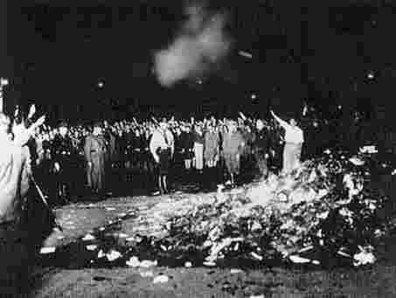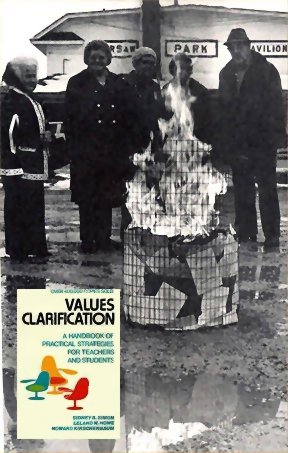

|
Shop Tested Procedures for Successful Book IgnitionAlmost invariably, book burning gets bad press. Why? Well, it's certainly not an environmental issue, though it clearly could be if practiced on a global scale. No, the problem is that books are, essentially, recorded thought, and burning them is universally perceived as the suppression of thought. Since freedom of expression is something most of us hold sacred, what else could book burning be but an act of despicable profanity? On May 10, 1933, Nazi propagandist Dr. Joseph Goebbels issued an order for public book burning, targeting works by, among others, Bolsheviks, Jews, and our own Boy Socialist of Oakland, novelist Jack London. Thus, the National Socialist German Workers Party ushered in an era of censorship like none other in recorded history. Almost all of us condemn such wholesale suppression of thought - this species of book burning - even if we actively disdain what's being expressed.

However, when things are more narrowly (or personally) targeted, especially at that which is perceived to threaten our children, more of us are willing to get on board. On a wet, dreary day in December, 1977, the Warsaw, Indiana, Senior Citizens Club obtained 40 copies of Simon, Howe & Kirschenbaum's Values Clarification: A Handbook for Practical Strategies for Teachers and Students and ceremonially burned them - and kept their hands warm - in the Warsaw Park Pavilion parking lot.

To some this was a sacred act, symbolizing the divine rejection of a sinister, albeit mushrooming educational movement that some have argued gave birth to and bred the "me" generation with its pro-choice, hedonistic approach to morality. Still, sacred or not, even this sort of book burning doesn't get widespread public approval, and most of us ultimately come down on the side of live and let live. For one, I do. If a book has the potential to undermine the values we teach our children at home, our fight isn't with the book anyway; it's with those who believe in it - more specifically with those who attempt to shove its principles down our children's throats. In my opinion, there is one kind of book burning that is laudable, and only one narrowly defined group of citizens should be licensed (and insured) to do it - booksellers. More specifically, booksellers should be allowed, even encouraged, to burn unproductive inventory. I'm serious. Put a damn match to your junk and have some fun. Don't get me wrong. I'm not rejecting the alternatives. If I cup my hand to my ear, I can hear a chorus of dissenters chanting, "Donate, donate, donate!" But I would respectfully ask those who demur to ponder this: when you donate books, do you hand over all the books you don't want with a sigh of relief at getting them the hell out of your life or do you painstakingly select only those titles which are likely to do the beneficiary the most good and retain the rest? If the latter, I applaud you; however, based on what I see on the shelves of thrift shops across the fruited plain - and please, don't get me started on microwave cookbooks - I suspect that I could host a private party for the entire lot of Charitable Cherry Pickers in my 8' x 10' shipping room and still have space left over for 5 or 10 250' rolls of b-flute. The biggest problem with donating books, therefore, is that worthless books remain in the system. Tossing them in the trash is much better, but even this isn't ideal if they make mountains in landfills. No, the best thing you can do is burn them, and if your business is languishing, it may be the single most effective thing you can do for it. This is nothing less than Revivification (note the capital 'R'): "renewal or restoration of life: an act of recalling or restoring or the state of being recalled from death or apparent death or torpidity to life." Unproductive inventory is a ponderous, ponderous drag on any business. It takes up valuable space; it persistently tempts you to waste valuable time on something that promises almost nothing in return (and preys on your marketing mind too: "Maybe if I group these into lots and start them at $.99?"); it's a daily reminder of your failings as a bookseller; and finally, it exudes a weighty, stale miasma into the very the air you breathe. Sure, donate some of your better bad books to your local thrift shop, have a garage sale to get rid of more, and so on, but once you've distilled your inventory into the very quintessence of bibliographic slag, face it; the best thing to do is throw a book-burning party.
>>>>> Article continues on next page >>>>>
Questions or comments?
| Forum
| Store
| Publications
| BookLinks
| BookSearch
| BookTopics
| Archives
| Advertise
| AboutUs
| ContactUs
| Search Site
| Site Map
| Google Site Map
Store - Specials
| BookHunt
| BookShelf
| Gold Edition & BookThink's Quarterly Market Report
| DomainsForSale
| BookThinker newsletter - free
Copyright 2003-2011 by BookThink LLC
|

|